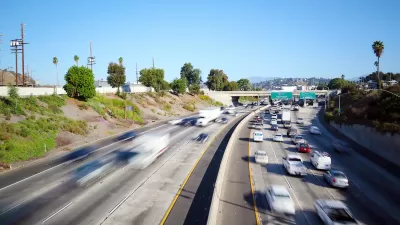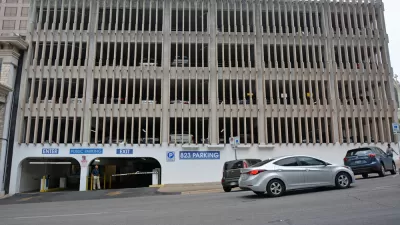Commute times vary significantly depending on race, according to a recent study. The consequences of the imbalance have very real social and economic effects for already marginalized racial groups.

The Federal Reserve Bank of Philadelphia recently published a working paper documenting the racialized differences in commuting from 1989 to 2019. Researchers from the Massachusetts Institute of Technology, the University of Pennsylvania, the University of Connecticut, and the Federal Reserve Bank of Philadelphia Research Department complete the study by examining Census and American Community Survey data to document Americans’ increasing car dependence, focusing on how that trend has varied depending on racial demographics over the course of the past four decades.
As article by Kea Wilson for Streetsblog USA shares news about the report, calling attention to the drawbacks of car ownership for Black Americans:
As previous research has shown, Black commuters in the U.S. have pretty much always had the longest commutes of any group, averaging 26 minutes each way back in 1980 when census-takers first began asking U.S. residents how long it took them to get to to work. That was five minutes longer than their White counterparts’ average journeys to work that year, or about 50 lost minutes every single week — a difference that the researchers attribute in large part to the fact that Black road users were (and still are) significantly more likely to rely on shared and active modes, neither of which are given the resources necessary to get people where they need to go conveniently.
While the difference might seem insignificant, Wilson cites a 2017 study from the University of West Bristol that quantifies the very real impacts of commute length on quality of life. Every minutes, as it turns out, makes a difference.
The article also examines what the Federal Reserve’s study indicates about needed policy reforms. “At least at first glance, that might seem like a good argument for subsidizing private vehicle ownership among Black commuters, as some non-profits have done for low-income families, sometimes to positive effect,” writes Wilson before noting the ongoing housing affordability challenges driving the trends. “[U]nless big cities end housing and employment segregation, no amount of driving subsidy can meaningfully speed up Black workers’ commutes, even if we can someday close the gap among workers’ driving times by sticking everyone in giant traffic jams.”
FULL STORY: Study: Car Ownership Doesn’t Always Cut Black Workers’ Commutes

Alabama: Trump Terminates Settlements for Black Communities Harmed By Raw Sewage
Trump deemed the landmark civil rights agreement “illegal DEI and environmental justice policy.”

Planetizen Federal Action Tracker
A weekly monitor of how Trump’s orders and actions are impacting planners and planning in America.

The 120 Year Old Tiny Home Villages That Sheltered San Francisco’s Earthquake Refugees
More than a century ago, San Francisco mobilized to house thousands of residents displaced by the 1906 earthquake. Could their strategy offer a model for the present?

Ken Jennings Launches Transit Web Series
The Jeopardy champ wants you to ride public transit.

BLM To Rescind Public Lands Rule
The change will downgrade conservation, once again putting federal land at risk for mining and other extractive uses.

Indy Neighborhood Group Builds Temporary Multi-Use Path
Community members, aided in part by funding from the city, repurposed a vehicle lane to create a protected bike and pedestrian path for the summer season.
Urban Design for Planners 1: Software Tools
This six-course series explores essential urban design concepts using open source software and equips planners with the tools they need to participate fully in the urban design process.
Planning for Universal Design
Learn the tools for implementing Universal Design in planning regulations.
Clanton & Associates, Inc.
Jessamine County Fiscal Court
Institute for Housing and Urban Development Studies (IHS)
City of Grandview
Harvard GSD Executive Education
Toledo-Lucas County Plan Commissions
Salt Lake City
NYU Wagner Graduate School of Public Service





























